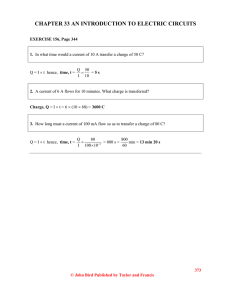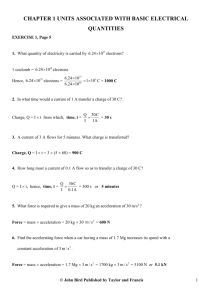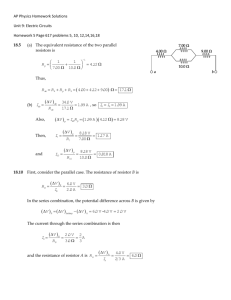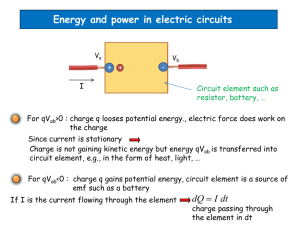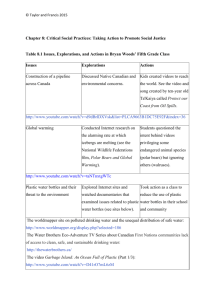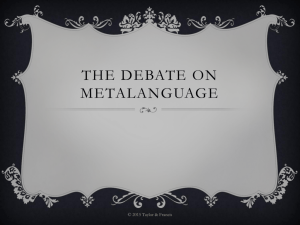Chapter 2
advertisement
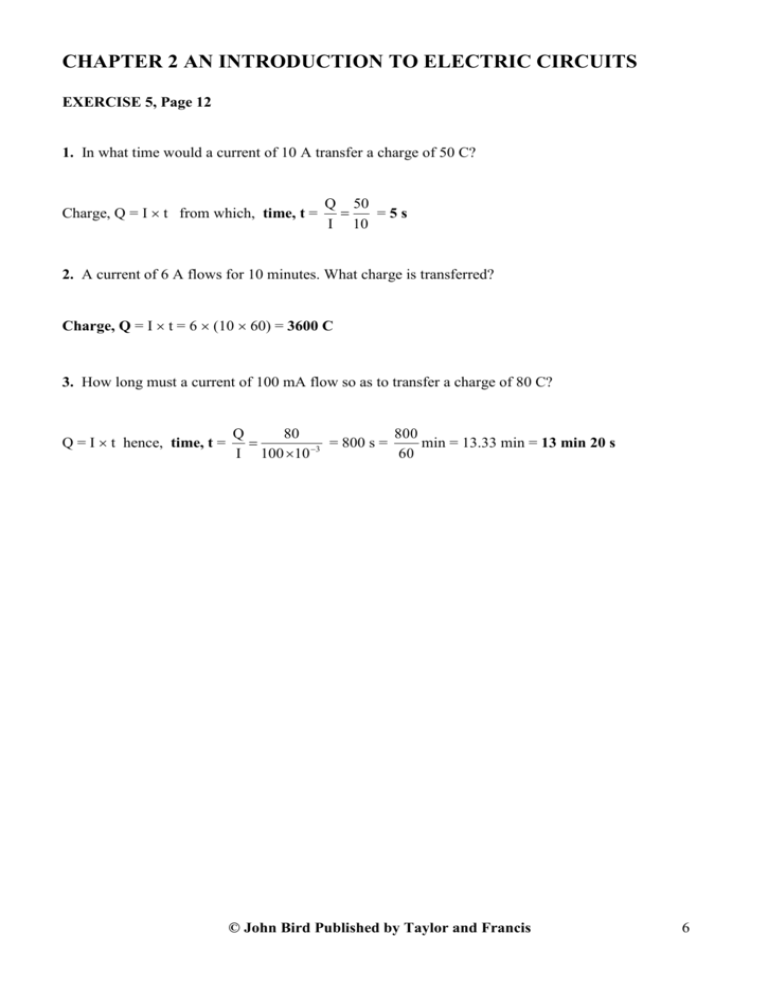
CHAPTER 2 AN INTRODUCTION TO ELECTRIC CIRCUITS EXERCISE 5, Page 12 1. In what time would a current of 10 A transfer a charge of 50 C? Charge, Q = I t from which, time, t = Q 50 =5s I 10 2. A current of 6 A flows for 10 minutes. What charge is transferred? Charge, Q = I t = 6 (10 60) = 3600 C 3. How long must a current of 100 mA flow so as to transfer a charge of 80 C? Q = I t hence, time, t = Q 80 800 = 800 s = min = 13.33 min = 13 min 20 s 3 I 100 10 60 © John Bird Published by Taylor and Francis 6 EXERCISE 6, Page 15 1. The current flowing through a heating element is 5 A when a p.d. of 35 V is applied across it. Find the resistance of the element. Resistance of element, R = V 35 =7 I 5 2. A 60 W electric light bulb is connected to a 240 V supply. Determine (a) the current flowing in the bulb and (b) the resistance of the bulb. (a) Power, P = V I, hence, current, I = (b) Resistance, R = P 60 = 0.25 A V 240 V 240 = 960 I 0.25 3. Graphs of current against voltage for two resistors P and Q are shown in Figure 2.9. Determine the value of each resistor. For resistor P, resistance, R = V 16 10 6 2 103 = 2 m 3 I 8 10 V 20 10 6 5 103 = 5 m For resistor Q, resistance, R = 3 I 4 10 4. Determine the p.d. which must be applied to a 5 k resistor such that a current of 6 mA may flow. © John Bird Published by Taylor and Francis 7 P.d., V = I R = 6 103 5 103 = 30 V 5. A 20 V source of e.m.f. is connected across a circuit having a resistance of 400 . Calculate the current flowing. Current, I = V 20 = 0.05 A or 50 mA R 400 © John Bird Published by Taylor and Francis 8 EXERCISE 7, Page 17 1. The hot resistance of a 250 V filament lamp is 625 . Determine the current taken by the lamp and its power rating. Current, I = V 250 = 0.4 A R 625 Power rating, P = V I = 250 0.4 = 100 W V 2 2502 (or P = = 100 W R 625 or P = I 2 R 0.4 625 = 100 W) 2 2. Determine the resistance of a coil connected to a 150 V supply when acurrent of (a) 75 mA (b) 300 μA flows through it. (a) Resistance, R = V 150 2000 = 2 k I 75 103 (b) Resistance, R = V 150 500000 500 k or 0.5 MΩ I 300 10 6 3. Determine the resistance of an electric fire which takes a current of 12 A from a 240 V supply. Find also the power rating of the fire and the energy used in 20 h. Resistance, R = V 240 = 20 I 12 Power rating, P = V I = 240 12 = 2880 W or 2.88 kW Energy = power time = 2.88 kW 20 h = 57.6 kWh 4. Determine the power dissipated when a current of 10 mA flows through an appliance having a resistance of 8 k. Power, P = I2 R 10 103 8 103 = 0.8 W 2 © John Bird Published by Taylor and Francis 9 5. 85.5 J of energy are converted into heat in 9 s. What power is dissipated? Power, P = energy 85.5 J = 9.5 W time 9s 6. A current of 4 A flows through a conductor and 10 W is dissipated. What p.d. exists across the ends of the conductor ? Power, P = V I hence p.d., V = P 10 = 2.5 V I 4 7. Find the power dissipated when: (a) a current of 5 mA flows through a resistance of 20 k (b) a voltage of 400 V is applied across a 120 k resistor (c) a voltage applied to a resistor is 10 kV and the current flow is 4 mA (a) Power, P = I2 R 5 10 3 20 103 = 0.5 W 2 (b) Power, P = V2 4002 = 1.33 W R 120 103 (c) Power, P = V I = 10 103 4 103 = 40 W 8. A battery of e.m.f. 15 V supplies a current of 2 A for 5 min. How much energy is supplied in this time? Energy = power time = (V I) t = (15 2) (5 60) = 9000 J or 9 kJ 9. A d.c. electric motor consumes 72 MJ when connected to 400 V supply for 2 h 30 min. Find the power rating of the motor and the current taken from the supply. Energy = power time from which, power = enery 72 10 6 J 8000W = 8 kW time 150 60s © John Bird Published by Taylor and Francis 10 Power = V I from which, current = P 8000 = 20 A V 400 10. A p.d. of 500 V is applied across the winding of an electric motor and the resistance of the winding is 50 . Determine the power dissipated by the coil. Power dissipated by coil, P = V 2 5002 = 5000 W = 5 kW R 50 11. In a household during a particular week three 2 kW fires are used on average 25 h each and eight 100 W light bulbs are used on average 35 h each. Determine the cost of electricity for the week if 1 unit of electricity costs 15p Energy in week = 3(2 kW 25 h) + 8( 100 103 kW 35 h) = 150 + 28 = 178 kWh Cost = 178 15 = 2670p = £26.70 12. Calculate the power dissipated by the element of an electric fire of resistance 30 when a current of 10 A flows in it. If the fire is on for 30 hours in a week determine the energy used. Determine also the weekly cost of energy if electricity costs 13.50p per unit. Power, P = I 2 R 10 30 = 3000 W or 3 kW 2 Energy = power time = 3 kW 30 h = 90 kWh Cost = 90 13.50p = 1215p = £12.15 © John Bird Published by Taylor and Francis 11 EXERCISE 8, Page 19 1. A television set having a power rating of 120 W and electric lawnmower of power rating 1 kW are both connected to a 250 V supply. If 3 A, 5 A and 10 A fuses are available state which is the most appropriate for each appliance. Power, P = V I hence, current, I = For the television, I = P V P 120 = 0.48 A, hence the 3 A fuse is the most appropriate V 250 For the lawnmower, I = P 1000 = 4 A, hence the 5 A fuse is the most appropriate V 250 © John Bird Published by Taylor and Francis 12
